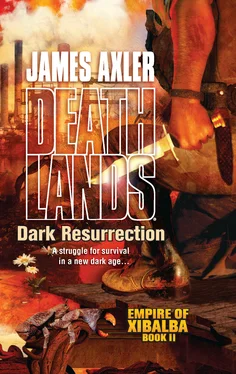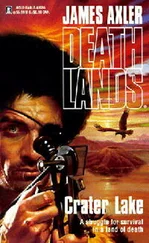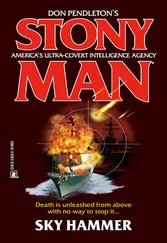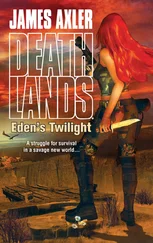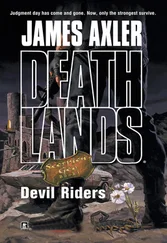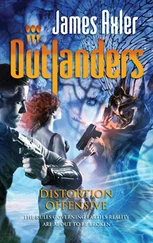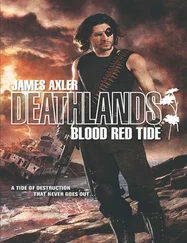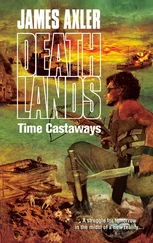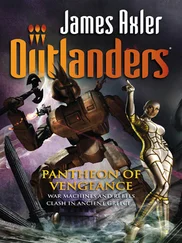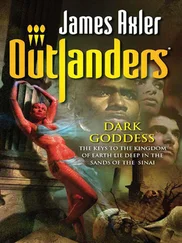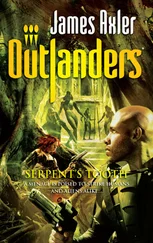A civilian suddenly darted through the line of red sashes and jumped into the back of the stake truck before anyone could stop him. His eyes looked bloodshot and squirrelly, like he was strung out on jolt. He had a long, thin-bladed knife clasped between his teeth, the sharp edge pointing away from his lips. Whipping the knife from his jaws, with an animal cry, he charged for Ryan.
The reveller intended to do a little sacrificing himself, maybe grab some of glory of the moment.
Ryan easily deflected the too-slow lunge with his manacled wrists and delivered a cracking head butt. Blood gushed from the man’s crushed nose, but it was already lights out, squirrelly eyes rolling back in his skull. Doc, Mildred and Jak seized hold of the attacker’s arms and legs and threw him out of the truck. The red sashes swarmed in and pulled the unconscious man away.
They were still beating him into the pavement when High Pile hopped back on the running board and the trucks resumed their slow-speed parade. They drove past a railroad terminal, obviously long-abandoned. From there the convoy followed the road’s curve onto the peninsula. Behind them, the mob followed, clogging the street curb to curb. It trailed them for what Ryan guessed was close to two miles. Then the trucks turned off the road and parked on a stone quay between a row of stone buildings and the edge of the bay.
Forty feet away, across the water, was the old Spanish fort. Bright lights aiming down from notches in the battlements illuminated a low, pedestrian bridge that connected the fort to the quay.
The captives were shoved out of the stake trucks and forced to line up beside them. At High Pile’s order, the Matachìn disconnected Ryan from the file, pulled him from the ranks and pushed him to the bridge.
It appeared he was the slave of honor.
The far end of the bridge terminated at the point of one of the ravelins. The diamond-shaped projection, three-stories of windowless, weathered limestone block, stuck out from the fort’s perimeter. Ryan could see a narrow archway at the bridge’s end, and an open wrought-iron gate.
Urged forward at blasterpoint onto the bridge, Ryan glanced over the side. In the lights from the battlements he saw bones. Human bones in the crystal-clear water. The bottom was carpeted with mounds of them. Stripped white, jumbled skulls, long bones, ribs. There were darker blotches, too, and they were moving sideways. Crabs the size of dinner plates crawled over the piles of naked bones, looking for a snippet that the others had missed.
Fat, happy crabs.
To get a view out the screen in the deck hold’s narrow air vent, Daniel Desipio had to press his temple against the ceiling and crane his neck at a painful angle. The twentieth-century freezie and author of twenty-nine published novels could hear the wild victory celebration outside, but he couldn’t see any of it. The view out the bug-proofed air vent was entirely blocked by the bow of the tug moored closely behind.
Despondent, Daniel slumped back to the floor of his five-by-five-by-five cell and hung his head in his hands. There would have been no great victory in Deathlands without him, yet no one knew or cared about his contribution to the campaign. His thoughts slipped into a deep, dark and familiar groove.
More than a century earlier, before Armageddon, while still a ghost writer on the Slaughter Realms pulp action series, he had often imagined his publisher’s holiday office parties: the editors and assistants—English Lit majors all—in cotillion gowns and black tuxedos, consuming champagne punch and finger sandwiches to the strains of live, string quartets. While committees of Lit majors risked broken fingernails fastening paper clips to two-sentence memos, Desipio struggled alone and under poor light with hundred-thousand-word deadlines. While the SR editorial staff took latte and croissant breaks, he lived on water and corn dogs. Instead of winter vacationing in the Bahamas, driving company cars, carrying company credit cards, the lowly ghost expeditioned to the corner 7/11 on foot and paid for his hot dogs in loose change. He imagined editorial’s sweeping, panoramic view from the tower office block; he had no view at all. In his previous life, he had lived belowground, in a grotty, two-room, basement apartment in the flatlands of Berkeley, California. The concrete floor sweated. The concrete walls sweated. He sweated. His above-ground neighbors, all rich college students and professors, mocked him and called him “the Mole Man” to his face.
All Daniel Desipio really had was his devotion to writing, his Art. To further it, and to break the economic and social bonds that kept him from reaching his full creative potential, he had volunteered for ultrasecret lab-rat duty in the jungles of Panama. This in the hope that the experience would give him something truly original and important to write about, and allow him to stake his claim to fame and wealth.
Long before nukeday’s dawn, things had gone very wrong on the remote prison island. During the course of the black box-funded experiments, his blood became infected with an engineered virus of unheard-of and unstoppable lethality, but to which he was immune. He had been offered a choice by the facility’s whitecoats: to live out the rest of his life in isolation on the island hellhole or to go into cryogenic sleep until a cure could be found.
When he was reanimated more than one hundred years later, he was shocked to learn that there was still no cure for the virus in his blood; that in the interim the civilized world had blown itself apart and that he was to be deployed as a walking biological weapon by the tenth-generation offspring of the penal colony’s original rapists and murderers.
Through the narrow air vent, the clamor of the crowd crescendoed. The pirates had begun their victory lap around Veracruz’s central square.
Daniel lowered his forehead to his upraised knees, and then thumped it upon them, hard, over and over again. After all the effort he’d made and the pain he’d endured, what in his life had changed?
He still got no credit for his heroic deeds, only now the body count he created was real, and he wasn’t paid a penny in compensation. He still lived in a hole, only now it was under even worse conditions. He had a bucket for a toilet and no toilet paper. He ate with his fingers out of an old tin can. No TV or skin mags for companionship. No showers. Whether imprisoned belowdecks or walking free as a plague vector, he was still looked down upon by everyone he met—everyone except the droolies. He’d always been able to count on the droolies.
Though as far as he knew there were no more novels of any kind being published, though he had no writing instruments or paper, that didn’t stop him from attempting to compose great works of destiny in his mind. But unhappily, no matter the starting point, all his epic, original ideas eventually turned into Slaughter Realms books. No matter how hard he tried, he couldn’t get the series and the characters out of his head. Perhaps it was a function of his having written so many of them? Or perhaps cryogenesis had permanently damaged his creative synapses.
Sooner or later, the characters started to banter and jive like the series’ regulars. Instead of the vast, labyrinthine conspiracies he envisioned himself writing, the stories devolved into highly detailed, sword and gun fights, and the occasional extraneous, space-filling sexual romp. Heads parted company with necks; cranial contents Jackson-Pollacked opposing mud-plastered walls and ceilings; bowels tumbled steaming from torsos in fat gray coils; and sweat-lubricated bodies writhed in ecstasy and exploded in impossible joy.
In sum, his 137 years of existence had been nothing less than a classic, wall-to-wall fuck up.
Читать дальше
